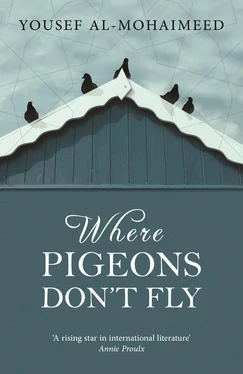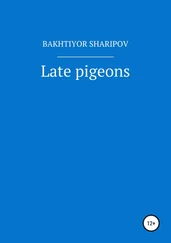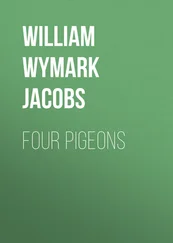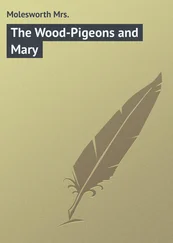Faced with the male mourners his young eyes welled. He hated their makeshift tenderness as they pityingly stroked his head. A boy of fifteen has a real need for a proper father like Suleiman, not just a paterfamilias who commands and denies, but an intimate friend in whose embrace he could find refuge.
How hard it had been, accompanying them in the hearse to Naseem Cemetery, driving in awful silence from Rajehi Mosque on to the Eastern Ring Road then into East Riyadh and through the long wall around the graveyard. A sob rattled in his chest and his Uncle Saleh drew his head towards him and said, ‘You’re the man of the house now.’
Fahd gave a sudden groan and Saleh stroked his hair.
‘Take refuge from Satan, Fahd.’
How hard it was to be surrounded by men, most of whom he didn’t know, as they singled him out with their consoling words. One, the stupidest of the lot, put five hundred riyals into his top pocket. Was this the value placed on the departed? How hard it was to return home with his Uncle Saleh and cousin Yasser, carrying his father’s brown mashlah that had covered his coffin. How hard for a fifteen-year-old boy to come home to find his mother and sister weeping together and be scarcely able to make them out through the cascade of tears veiling his eyes and drowning his heart in precocious, merciless sorrow. How often after that did Fahd lie in bed at night hugging his father’s mashlash and breathing in its scent, berating himself and muttering out loud, until the tears drenched his clothes and he finally fell asleep at dawn?
I have not had my fill of you, Father! How could you go and fulfil the prophecy of that stupid rhyme? Why did you leave me all alone and naked? You never lived: just an outcast childhood, a youth spent imprisoned and in exile and finally a grown man denounced by his own family. No one would welcome an old ex-con until fortune finally favoured you with a wonderful Jordanian woman, Soha, my mother. But your luck was cursed, scarcely baring its teeth in a false smile before you were whisked away in the blink of an eye. I miss you, Father, now more than ever before. I miss you most in my youth. I miss you even at the dead of night as I ready myself for sleep and feel the loneliness, desolation and interminable tears. A night without end.
Do you know what it means for a fifteen-year-old boy to go out to Zuhair Rustom Alley every afternoon and sit waiting for you on the doorstep? Can you understand the depths of his despair, his wailing sobs, every time he sees a car that reminds him of your wine-red Caprice. I swear that if you knew how my heart trembled, how my groans betrayed me as I circled your car like an imprisoned puppy longing to escape from its shadowy seats, you would have sprung from your grave in an instant and sprinted from the cemetery, your hair unkempt and covered with the coffin’s dust, traversing the streets like a man possessed to clasp me in your arms, pulling my little head to your chest and sobbing in remorse, ‘Never again, Fahd. I swear to you I shall not die again so foolishly.’
It wounded me to hear Saeed say, ‘You’re lucky! You saw your father and spent your childhood with him, while I was born to find mine already gone!’
Saeed, can you know what it means to see if you were born blind? Of course you can’t, you could never see: your understanding of the world around you came from your other senses. But to lose your sight aged fifteen means that you have experienced the world and the pleasure of gazing upon it, only for everything to turn a misty white like milk. That is how I feel, my friend. That is how I came to see my father on every corner, on every street in Riyadh, to hear his unmistakable laugh in the shops. For years I woke terrified, as though his hand had fallen on my head to rouse me, gentle and calm: ‘Come on, Fahd. Time for school.’
You knew a little happiness, Father, living with my mother for a decade and a half. Then your dream passed away and you departed early. I, too, have known happiness for fleeting moments. But in this country they’re too sharp to let joy bloom unchecked. The guardians of twisted virtue, the guardians of the imprisoned breeze, leapt to pluck out my joy in its first year of life. I wonder, why do these severe and grim-faced men invade the precious privacy you have with your beloved?
— 6 —
LEFT ALONE IN THE detention cell without being told why, Fahd had no choice but to entertain ghosts from his own memory who insisted on visiting him. Entering Shalal Café one summer’s night, for example, Fahd was looking for Saeed in their usual spot in the seats furthest to the right, over where the air was a little warmer and away from the clamour of mobile phones, but couldn’t find him. Then he saw him a few seats further on, unsmiling, taking a pull on the mouthpiece of his shisha then raising his face to the heavens and noiselessly blowing out the smoke. Fahd descended on him boisterously.
‘Where’s Uncle Saeed got to?’
Saeed was in no mood for fun and laughter. He answered as though he were someone else, struggling to drag his words out from inside him. ‘I’m thinking about my strange life, Fahd. I’m thinking about a life with no childhood, about days with no flavour to them.’
‘Fear your Lord, sheikh! You’re doing fine. Be happy that you’re free: no mother or father to chase you around.’
‘I wish I had a father to chase me, one who I could take to the internal medicine specialist at Abdul Aziz Hospital, to the ophthalmologist at King Khaled Eye Hospital. I wish I had a father to take care of, to sit up with when he needed company. You know, people sometimes say it’s more painful to lose a father when you’re a child or teenager.’
‘Of course it’s more painful: you knew him and got used to him and you see him everywhere you go. Saeed, you can’t imagine how it feels to see my dad in the street. I see him on Urouba Road, going into Panda supermarket, standing outside Al-Ahnaf Bin Qais School with the other fathers, walking into Blue Diamond Video with me …’
Waving at a waiter who rushed past without noticing, Saeed interrupted him. ‘Sorry Fahd, but what you say is wrong. Real suffering is to enter the world without a father, to find yourself confronted by some husband of your mother’s and have to call him “Dad”.’
He was silent for a while, letting his bare head sink back like a man recalling his past. ‘My mother no longer trusts any man alive. All men are swindlers in her eyes. She thinks I’m always lying and cheating. My father, God have mercy on his soul, lied to her. Just imagine: when she was five months pregnant with me he came to her and said that he was going to take her and her mother to Mecca for the umra . My poor grandmother: she was so happy, dreaming of visiting the Grand Mosque again, a quarter of a century after she made the pilgrimage with my grandfather, who died a decade before I was born.
‘My mother never had the slightest idea what my father planned to do that day, the first of Muharram, 1400 AH. I was still in the womb. Maybe I could sense something, could hear what was going on in the Grand Mosque? Perhaps I heard the first shot that killed Muhsin, the one they called the first martyr to fall? My mother and grandmother were shut up with the other women and one of them convinced the rest that the Mahdi would fill the earth with justice and that the army of the oppressors would set out from Tabuk as foretold in the hadith . God would make the earth swallow them up, she told them, and the victorious Mahdi and his forces would set out for Medina followed by a great throng of people acclaiming him as their leader. There he would pray before leaving for Damascus, where he would lead the prayers following the return to earth of the Messiah, Eissa son of Mariam. That’s how they brainwashed their tiny minds.’
Читать дальше












